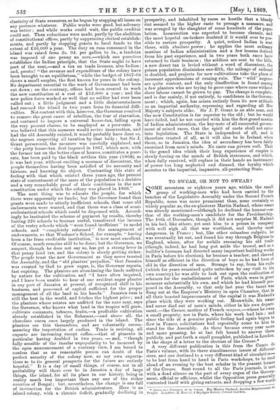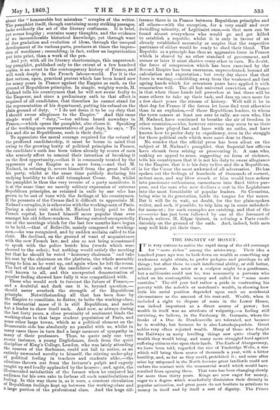TO SWEAR, OR NOT TO SWEAR ?
Q OME seventeen or eighteen years ago, within the small 0 group of working-men who had been carried to the benches of the Legislative Assembly under the Second French Republic, none was more prominent than, none certainly so widely popular as, the ex-plasterer Martin Nadaud, whose name was already mentioned—although he declined the honour—as that of the working-men's candidate for the Presidentship. The 10th of December, though it did not surprise M. Nadaud in his bed, like others, yet sent him to a prison in company with well nigh all that was worthiest, and thereby most dangerous, in France ; but, like other crimeless culprits, he was eventually let out, and found his way through Belgium to England, where, after for awhile resuming his old trade (though, indeed, he had long put aside the trowel, and as a builder's foreman had directed many important building works in Paris before his election), he became a teacher, and showed himself as efficient in the direction of boys as he had been of old in the direction of men. Strange to say, from his exile (which for years remained quite unbroken by any visit to his own country) he was able to look out upon the realization of schemes for the embellishment of Paris, which were in great measure substantially his own, and which he had himself proposed in the Assembly, so that only last year the taunt was flung out at the Emperor's Ministry in open Chamber, that in all their boasted improvements of the capital it was Nadaud plans which they were working out. Meanwhile, his name had never died out of men's minds, either in his own department,—the Creuse, mother of French macons,—where he owns a small property, nor in Paris, where his work had lain ; and since the tide of a genuine public feeling had again begun to flow in France, solicitations had repeatedly come to him to stand for the Assembly. As these became every year more and more pressing, he at last felt bound to answer them publicly, and put forth a small pamphlet, published in London, in the shape of a letter to the electors of the °reuse."' A very different publication is this from the Comte de Paris's volume, with its three simultaneous issues of different sizes, and one destined to a very different kind of circulation— to be lent from hand to hand in Paris workshops, to be read aloud of an evening by the best scholar in the peasant homes of the Creuse. Sent round to all the Paris journals, it met with a dead silence on the part of every organ of the Government, official or officious, whilst the Opposition press generally contented itself with giving extracts, and dropping a few words about the " honourable but mistaken " scruples of the writer. The pamphlet itself, though containing many striking passages, lacks evidently the art of the literary craftsman. It is brief, yet seems lengthy ; contains many thoughts, and the evidence of no inconsiderable historical knowledge, yet through want of due gradation and evolution of ideas, through the unequal development of its various parts, produces at times the impression of wordiness ; resembling, in fact, rather an improvization put into print, than a work of the pen. And yet, with all its literary shortcomings, this unpretending pamphlet, published only to the extent of a few hundred copies, is an event in the contemporary history of France, and will work deeply in the French labour-world. For it is the first serious, open, practical protest which has been heard now for many years in France against the Empire as such, on the ground of Republican principles. In simple, weighty words, M. Nadaud tells his countrymen that he will not swear fealty to the Emperor, and since a preliminary oath to that effect is required of all candidates, that therefore he cannot stand for the representation of his department, putting his refusal on the plain ground of duty. " I do not deem it to be any duty that I should swear allegiance to the Empire." And this same simple word of "duty,"—too seldom heard nowadays in France,—which opens the pamphlet, also closes it. Speaking of the working-men representatives of past days, he says, " To live and die as Republicans, such is their duty."
To appreciate the moral courage required for the refusal of the proffered candidateship, it must be borne in mind that owing to the growing laxity of political principles in France, the candidate's oath has been taken already by scores of men who scarcely affect to conceal their intention of breaking it on the first opportunity,—that it is commonly treated by the opponents of the Empire as a mere form,—and that M. Nadaud, in refusing it, severs himself from the great bulk of his party, whilst at the same time publicly declaring his undying hostility to the still triumphant Caesar. But, whilst the pamphlet is thus the very reverse of a party manifesto, it is at the same time no merely solitary expression of extreme Republican principles, as retained in exile by one who has grown to be out of tune with the feelings of his countrymen. If the peasants of the Creuse find it difficult to appreciate M. Nadaud's scruples, it is otherwise with the working-men of Paris. During a short visit which M. Nadaud lately paid to the French capital, he found himself more popular than ever amongst his old fellow-workers. Having entered unexpectedly one of the meetings which for the last few months have begun to be held,—that of Belleville, mainly composed of workingmen,—he was recognized, and by sudden acclaim called to the chair. He declined, on the ground of want of acquaintance with the new French law, and also as not being accustomed to speak with the police beside him (words which were cheered to the echo); but nothing would satisfy the meeting but that he should be voted "honorary chairman " and take his seat by the chairman on the platform, the whole assembly rising to him as he went up, and again when he left the room. The fact of his refusal of the candidates' oath was, of course, well known to all, and this unexpected demonstration of popular feeling showed how fully it was sympathized with.
Those who would seek to forecast the future of France,—
and a doubtful and dark one it is, beyond question,— should never overlook the strength of the Republican Principle. Notwithstanding all that has been done by the Empire to conciliate, to flatter, to bribe the working-class, the substantial mass of it is still Republican, and needs but a leader to show itself such. And now, as always during the last forty years, a close proximity of sentiment binds the working-class to that large student population of Paris, and some other large towns, which as a political element on the Democratic side has absolutely no parallel with us, whilst in many cases these in turn find a large measure of sympathy in many of their professors. Thus, to quote only one very recent instance, a young Englishman, fresh from the quiet discipline of King's College, London, who was lately attending the courses of the Sorbonne, could not fail to notice, as an entirely unwonted novelty to himself, the stirring under-play of political feeling in teachers and students alike, the Anions thrown out from the lecturer's pulpit and eagerly caught up and loudly applauded by the hearers ; and, again, the ill-concealed satisfaction of the former when he conjured his audience for his own sake to forbear all such manifestations of feeling. In this way there is, as it were, a constant circulation of Republican feelings kept up between the working-class and a large portion of the professional class. And the huge dif
ference there is in France between Republican principles and all others—with the exception, for a very small and ever dwindling minority, of Legitimist ones,—is that men can be found almost everywhere who would go and get killed to establish a republic, whilst it is only in favour of an already established monarchy or empire that the respective partizans of either would be ready to shed their blood. The Republic as a principle has thus an aggressive force in France which is shared by no other standard of government, and sooner or later it must shatter every other in turn. No doubt, the force of compression which has been exercised by the Second Empire has been enormous, unprecedented, beyond all calculation and expectation ; but every day shows that that force is wasting,—dribbling away from the weakened and fast ageing hands which for seventeen years have applied it with remorseless will. The all but universal conviction of France is that when those hands fall powerless at last there will ba none others to take up their task, and dam up once more for a few short years the stream of history. Well will it be in that day for France if the forces let loose find vent otherwise than in an explosion,—if those Republican leaders, to whom the town masses at least are sure to rally, are men who, like M. Nadaud, have continued to breathe the air of freedom in other countries,—who, however extreme may seem to us their views, have played fast and loose with no oaths, and have known how to prefer duty to expediency, even in the struggle for those political ends which were most dear to them.
No wonder that the official press has been silent on the subject of M. Nadaud's pamphlet, that Imperial law officers have shrunk from seizing or prosecuting it. A man who, making no appeal to arms, suggesting no form of violence, tells his countrymen that it is not his duty to swear allegiance to the Empire, that it is his duty to live and die a Republican, is for the Caesar the most awkward of all adversaries. Ile has spoken out the feelings of hundreds of thousands of earnest, ardent men, and any blow struck at him would turn ardour into passionate enthusiasm, earnestness into fixed bitter purpose, and the man who now declines a seat in the Legislature into the most formidable of popular leaders. So Cresarism, being wise in its generation, holds its tongue for the nonce. But it will lie in wait, no doubt, for the too plain-spoken writer, and seek, if possible, to trip him up in some unlookedfor moment ; for such examples are catching, and that of the ex-ouvrier has just been followed by one of the foremost of French writers, M. Edgar Quinet, in refusing a Paris candidateship on the ground of the oath. And, indeed, both men may well bide yet their time.































 Previous page
Previous page